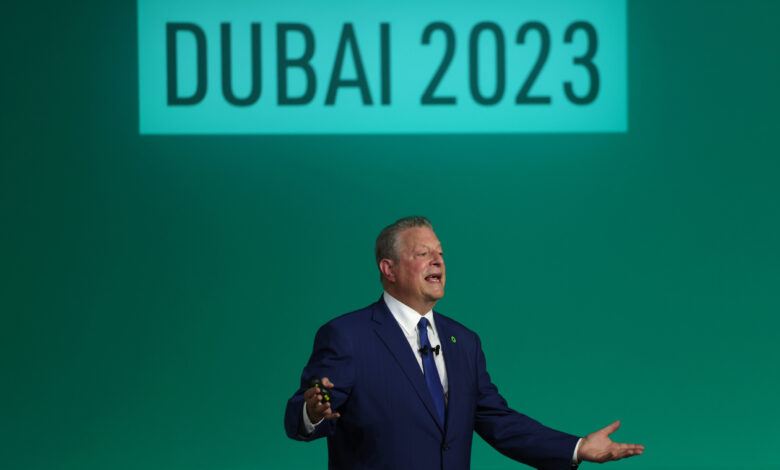Deadline Looms: COP28 Struggles to Secure Fossil Fuel Phase-Out Agreement

The Final Report from UN COP28 Climate Talks: Analysis and Reaction
The draft released Monday of the final report from the United Nations COP28 climate talks in Dubai has sparked widespread controversy and disappointment. One of the most significant omissions in the report is the absence of a call to phase out the use of fossil fuels, leaving many climate advocates and leaders from low-lying island nations feeling let down. This contentious development has led to public outcry and has raised concerns about the effectiveness of COP28. Former Vice President Al Gore expressed his frustration, likening the draft to a document dictated by OPEC, garnering attention and fueling the ongoing debate. As the negotiations near their scheduled conclusion, the need to accelerate the energy transition and achieve substantial reductions in greenhouse gas emissions remains a central issue. However, the lack of clear action on fossil fuels has overshadowed other aspects of the negotiations, leading to intense scrutiny and heated discussions among delegates and observers.
President’s Address
COP28 President Sultan Al Jaber’s address on Monday acknowledged the progress made but emphasized the need for elevated ambition, particularly regarding fossil fuels language. However, his dual role as both the COP leader for the host country, the United Arab Emirates, and an executive with the UAE’s national oil company has come under criticism, casting doubt on the impartiality of the negotiations.
Draft’s Ambiguity
The draft report’s references to fossil fuels were cloaked in vague terms that failed to commit to significant action. The language suggested that national governments “could include” measures to reduce the production and consumption of fossil fuels to achieve net-zero emissions by “or around” 2050. Furthermore, the recommendations concerning coal, the most carbon-intensive of fossil fuels, revolved around a phase down of “unabated” coal power, implying the use of carbon capture and storage technology (CCS). This approach has been met with skepticism, as critics argue that CCS is costly and unproven at the scale required to make a substantial impact on global emissions.
Global Response
Representatives from nations most vulnerable to climate change, particularly those facing the threat of rising sea levels, expressed discontent and called for an unequivocal commitment to phasing out fossil fuels. The urgency and severity of the climate crisis were underscored by Marshall Islands’ Natural Resources and Commerce Minister John Silk, who made a resolute plea for action, emphasizing the existential threat faced by vulnerable nations.
Paris Agreement Goals
The final report from COP28 is set to assess progress towards the goals outlined in the Paris Agreement, which seeks to limit global warming to “well below” 2 degrees Celsius and pursue efforts to restrict it to 1.5 degrees Celsius beyond pre-industrial levels. The lack of decisive action on fossil fuels poses a significant challenge to achieving these crucial targets, raising concerns about the effectiveness of COP28 in driving meaningful change.
Implications Beyond Negotiations
While the global stocktake serves as the official outcome of COP28, the broader impact of the negotiations extends beyond the text of the final report. The role of civil society representatives, trade associations, and non-governmental organizations has become increasingly pivotal, signaling a shift in the locus of action and influence within the climate discourse. Additionally, agreements and commitments announced outside the official negotiations, such as efforts to control methane emissions, have emerged as crucial developments in the pursuit of effective climate action.
As the negotiations unfold, the discussion surrounding financing for climate solutions and addressing the loss and damage experienced by impoverished nations remains of paramount importance. Despite the significance of these issues, the nonbinding nature of the final report has led to skepticism about the tangible impact of the document and the broader outcomes of COP28.




